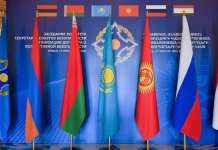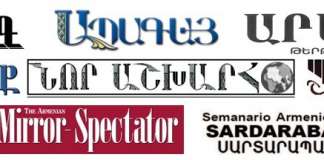Many challenges await Armenia in 2024. Thomas de Waal, a specialist in the Nagorno-Karabakh conflict and a senior analyst at the Carnegie Foundation, stated this in an interview with the RFE/RL Armenian Service.
Undoubtedly, this is a very crucial, important, somewhat dangerous moment for Armenia in 2024. The country faces perhaps the most difficult choices, comparable to the situation in the late 1980s or even the 1920s. Of course, it is about the loss of Karabakh and the fleeing of the Armenian population from there. This is a serious moment for Armenia, which some compare with the Genocide of 1920 or even 1915. This will also be the year when Armenia will face not only the threat from Azerbaijan, but also the threat of losing or severing relations with Russia. Thus, in 2024, many challenges await Armenia without a doubt, de Waal noted.
To the remark that for many Armenians, Russia not only abandoned them, but also betrayed them in a very dramatic way, Thomas de Waal responded by saying to start with the fact that, of course, Russia has always had many interests in this region. Although it may have always had stronger relations with Armenia, it has never abandoned relations with Azerbaijan. If we look at the recent history of the Karabakh conflict, we will see that there were moments when Moscow was closer to Baku—for example, in 1990 and 1991.
For Russia, its interests are the priority, and the fact that Armenians are Christians, the existence of traditional historical relations there are not so important. But, for sure, Moscow continues to be the main guarantor of Armenia’s security. There is a military alliance, and there are obligations that Moscow has undertaken towards Armenia.
What changed? Obviously, the situation began to change after Armenia’s Velvet Revolution in 2018, when incumbent PM Nikol Pashinyan came to power, who was a much more unpredictable and unreliable partner from Moscow’s point of view, while Azerbaijani president Ilham Aliyev continued to be a much more predictable and reliable partner; and that was one of the changes.
Then there was the war of 2020 when Moscow intervened only at the last moment. While the people of Karabakh welcomed Moscow’s intervention, Thomas de Waal believes that the Armenians have already realized that change.
As per de Waal, the decisive moment was the start of the war in Ukraine in February 2022, after which Russia’s priorities changed and everything began to revolve around this war and the war with the West. The Caucasus has become secondary, and everything is now secondary compared to those war efforts.
According to Thomas de Waal, if we look at what we have on the ground, we will see that on the one hand there is Armenia, which has a democratic government whose intentions seem to be more pro-European, and there is—from Russia’s point of view—a much more reliable partner in the form of Azerbaijan. He believes that if we read what Russian officials have been saying since the start of the war, it’s that they need to reorient the entire Russian economy from West to South and East; and South means Georgia, but it also means Azerbaijan, in particular; the railway to Azerbaijan via the Caspian Sea.
Azerbaijan is mainly a road for Russia to the south—to Iran and the Middle East. And in that case, Armenia becomes less important. And that’s why Thomas de Waal believes we saw this. For the first time in history, Russia did not react, and its peacekeeping forces in Nagorno-Karabakh did not react for the most part. Obviously, they were informed in advance that Azerbaijan was going to occupy Karabakh, de Waal added.
















